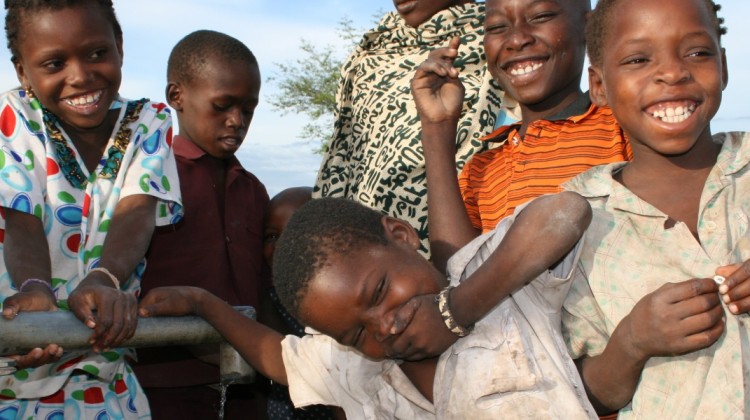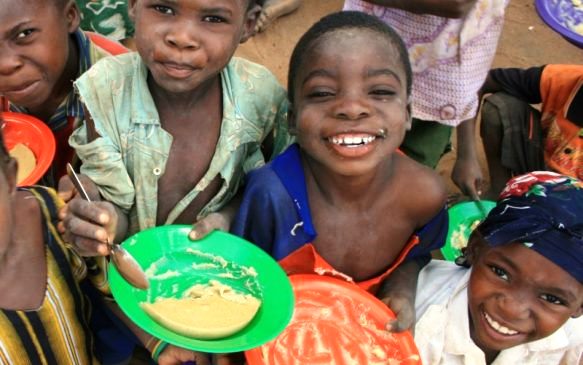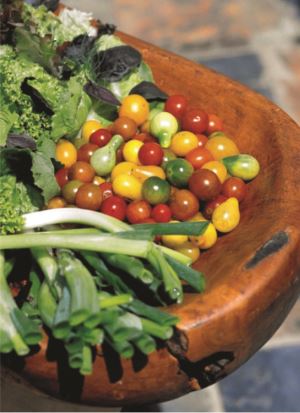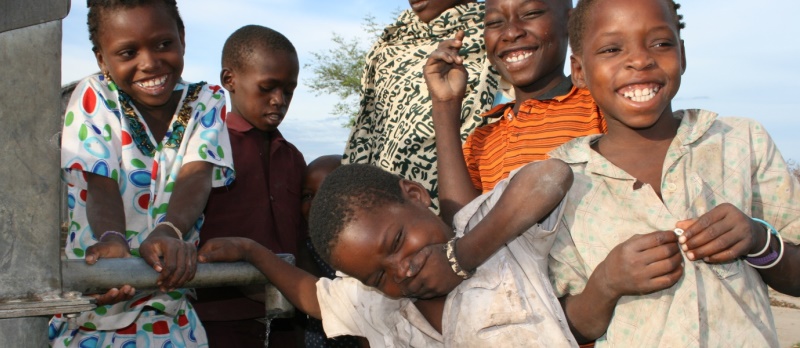World Food Day 2014: focus on safari camps success in school feeding programmes

World Food Day 2014 has given us a chance to reflect on the work many of the safari camps do behind the scenes with local communities. In some cases it’s ‘giving a man a fish’ while in others it’s more akin to ‘teaching a man to fish’.
School food programmes

Nema feeding project of school children Ningaia – Guludo
Many visitors to Africa will have visited local villages and seen schools. What isn’t necessarily apparent is that not only are the schools providing education, but also a meal for the children who attend, typically a high calorie, porridge-style food. For some this will be their only meal of the day, and it may initially be their main reason for coming to school. Lots of these schools and food programmes are started or supported by camps and lodges local to them and our clients may have visited Tujutane School supported by Tongabezi and its guests, and the Nema Foundation part of the raison d’etre for Guludo Lodge, Mozambique which was founded on philanthropic principles. Amy Carter-James who founded Guludo, says of the feeding programme “Before Nema started work, less than 1{13c8d4b31df5f805556ed83a8829bbffcaa4563894948df0cae38482b102b43c} of children went on to study at secondary school and less than 20{13c8d4b31df5f805556ed83a8829bbffcaa4563894948df0cae38482b102b43c} completed all 7 years at primary school. The underlying reason being the prohibitive cost and need for children to help gather food.” And in Tanzania, Lali Heath of the Nomad Trust says of Katumbi Nursery School in Mahale, “I think at the moment most of the kids come because of the free meal, but slowly I am sure we will be able to help provide them with more resources, and educational games for the classroom”
Community Agricultural Education Programmes – Making The Most Of The Land
Another side to community education are programmes designed to help local people both make the most of the land they farm. Manda Wilderness, a project supported by Nkwichi Lodge in Mozambique states the aim of their agriculture programme as: – Improve the community’s knowledge of agriculture and the principles of permaculture – Increase their access to tools and seeds – Enhance their agricultural production and variety – Gain access to markets to sell their products Before they had a demonstration farm, the project’s sustainable farming training took place in villages. The demonstration farm has overnight accommodation and allows more diverse and detailed training including elements such as small scale livestock production, bee keeping, fish farming, processing of fresh produce, and local arts and crafts. The success of the project is best summed up by the committee members of Umoji village who state “Our most successful projects? The agricultural projects with Maasai Wilderness Conservation Trust because the villagers receive seeds, watering cans and can sell their harvests to the lodge and everyone in our village.”
Avoiding Wildlife Conflict In Agriculture
Helping people keep wildlife off their subsistence farms is one of the better ways to ensure the support of wildlife projects from local communities. In the South Luangwa, villages close to the national park benefit from funding and training from the South Luangwa Conservation Society (SLCS). During the faming season fields are regularly raided by elephants and hippos who are free to move into the villages from the unfenced park. One of the SLCS projects involves protecting fields with fences constructed using sisal rope, old engine oil, grease, used bits of cloth and crushed dried chilli. The paste is made and applied to the sisal which runs around the fields. Bricks made from elephant dung are also made using a combination of elephant dung and crushed chilli. These are set alight during the night to smoulder and deter elephants.
Safari Camps And Innovative Farming Methods
Many safari camps are in areas where agriculture is marginal because of the climate or quality of the land. Rather than fly food in from huge distances innovative methods are being followed to produce food locally. 

Leave a Reply